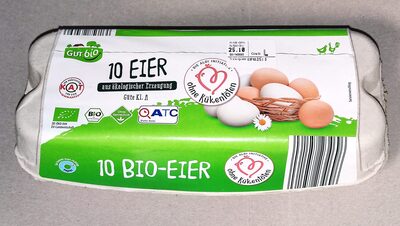
Barcode: 4061458234696
Eier
HALAL
📝 Reason: Eggs are considered Halal in Islamic dietary laws as they come from permissible birds and do not contain any Haram substances. The product does not list any E-codes or ingredients that are Haram or Doubtful, and there is no indication of cross-contamination with Haram substances.
📄 Certificates: None
Ingredients:
Details
Understanding the Halal Status of Eier (Eggs)
The Halal status of food products is paramount for many consumers worldwide, especially for those adhering to Islamic dietary laws. Eier, or eggs, have been a staple in many diets, but the question remains: Are Eier Halal? In this post, we will delve into their Halal status, ingredient breakdown, and what constitutes their permissibility.
Halal Status Explained
Eier, commonly known as eggs, are considered Halal according to Islamic dietary laws. This classification stems from the fact that they originate from permissible birds and do not contain any Haram (forbidden) substances. The inherent property of eggs makes them suitable for consumption by Muslims, provided they are free from contamination with Haram substances.
Ingredient Analysis
The simple ingredient list for Eier is just one item: Eier. Essentially, this means you are consuming eggs that are free from additives or any complex processing that might introduce Haram elements. The product does not list any E-numbers or suspicious ingredients that could make them doubtful in terms of Halal compliance.
Exploring the E-Numbers
The product’s E-numbers data indicates that there are no E-codes associated with Eier, which further simplifies the Halal inquiry. According to the provided data, the status of Eier is classified as:
- E-Code: N/A
- Name: Eier
- Status: 0 (Halal)
- Details: Eggs are generally considered Halal unless contaminated with Haram substances.
- Source: Islamic dietary laws consider eggs from permissible birds as Halal.
This structure indicates that unless there is a direct indication of contamination, Eier remains a safe option for those who observe Halal dietary restrictions.
Brand Context and Product Assurance
While there is no specific brand or certification associated with Eier in the provided data, it is worth noting that the classification relies on general standards across the industry. The absence of certification should not deter consumers, given that eggs have a long-standing legacy of being accepted as Halal food. Consumers are always advised to ensure that the source of the eggs aligns with Halal standards, particularly when purchasing from vendors who may not explicitly certify their products.
The Importance of Sourcing
It is essential to ensure that Eier are sourced from reputable suppliers committed to maintaining Halal practices. Eggs from birds that are fed a natural diet without cross-contamination with Haram ingredients further assure consumers of the product’s integrity. Additionally, awareness around any potential contamination during processing or packaging is critical to ensuring the Halal status remains intact.
Conclusion
In summary, Eier (Eggs) are classified as Halal under Islamic dietary laws due to their natural origin from permissible birds and their lack of Haram substances. Consumers looking for Halal options can confidently include Eier in their diets, as long as they are mindful of sourcing and potential contamination. The knowledge surrounding the ingredients and their Halal compliance empowers consumers to make informed choices that align with their dietary practices.

